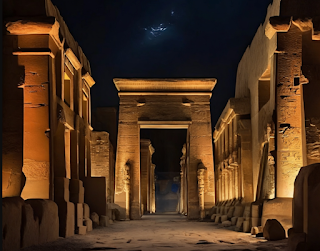Search Blog
Hit enter to search or ESC to close
Trending Now
Parshas Shemos/Vaera - The Birth of a New Religion and the Age of Miracles
- Get link
- X
- Other Apps
Shabbos HaGadol - The Hearts of the Fathers and the Sons
- Get link
- X
- Other Apps
- Get link
- X
- Other Apps
Until now, Moshe has mostly served as G-d's messenger to Pharaoh. With Bo, for the first time, Moshe steps into what will become his primary role as G-d's messenger to the Jewish people.
In Parsha Bo, Moshe is given a number of commandments, Rosh Chodesh, the celebration of the new month which makes it possible to celebrate the cycle of holidays, Passover, the commemoration of the coming exodus, the dedication of the first born, in counterpoint to the death of the Egyptian first born, and even a reference to Tefillin.
At the start of Parsha Bo, G-d reveals that everything that has happened was primarily so that, 'Lema'an Tisapher Beoznei Binecho UBen Binecho", so that the Jews would retell the story to their children and their children's children. Pharaoh and the might of Egypt had been mere object lessons for G-d.
The students were the Jews.
In announcing the final plague that will strike down the firstborn, we are told that G-d will execute judgement on all the gods of Egypt.
What does that mean and what does it have to do with the death of the firstborn?
Until now the Jews had operated in a passive role. They sat back and watched G-d do things while nothing was asked of them. Things proceeded as they had throughout human history with G-d intervening to punish the wicked, before everything went back to normal. But the climax of the Exodus was to break that cycle with the birth of Judaism and the Jewish people.
With the passover sacrifice, for the first time the Jews stopped being passive and became active. They brought the sacrifice and they placed the blood on the doorposts. The significance may appear minor when it was actually wholly transformative. By moving from the passive to the active, from helpless victims to men and women risking their lives and upending their normal routines to fulfill G-d's commandments, everything had changed. And thus the gods of Egypt were destroyed.Much later, the Prophet Elijah will confront the priests and worshipers of Baal in era when idolatry had overtaken the Jewish people. Elijah challenges the priests of Baal to summon fire. And after they exhaust themselves in futile ritual, he calls on G-d and fire consumes the sacrifice, the altar and the water around it. The Jews, who had been uncertain call out, "G-d is the Lord." A cry that we still echo at the climax of the Day of Judgement on Yom Kippur.
The gods of Egypt, like Baal, were mere human inventions. Their existence was limited to the mind of man. G-d can turn rivers to blood or bring down darkness and locusts, but only man can acknowledge G-d, not just temporarily, as Pharaoh occasionally did, but as a lifelong and multi-generational commitment.
Before the Jews actively did anything to worship G-d, the gods of Egypt could not truly be destroyed. When the Jews brought the Korban Pesach, the passover sacrifice, and celebrated G-d, then there was a contest not just between G-d and the Egyptians, but between the Jews and the Egyptians, between Judaism and the pagan idolatry of Egypt. And in that contest, the gods of Egypt fell.
And out of that contest, Judaism was born and G-d became known in the world.
You May Also Like
Shabbos HaGadol - The Hearts of the Fathers and the Sons
- Get link
- X
- Other Apps
Parshas Vaera - Bo - Were the Jews Affected by the Plagues?
- Get link
- X
- Other Apps








